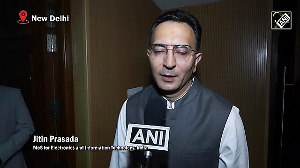"Current law prohibits the sale of nuclear technology to any country such as India which refuses to sign the Non Proliferation Treaty, refuses to allow full safeguards under the treaty and which develops nuclear weapons and detonates nuclear tests in defiance of the treaty," Democrat Ed Markey, who has co-sponsored the resolution along with his Republican colleague Fred Upton, said in a statement.
The Bush Administration's move to launch nuclear cooperation with India has "grave security implications for South Asia and the entire world," he claimed.
"Supplying nuclear fuel to countries that are not party to the Nuclear Nonproliferation Treaty derails the delicate balance that has been established between nuclear nations and limits our capacity to insist that other nations continue to follow this important nonproliferation policy," Markey said.
"We cannot break the nuclear rules established in the Nuclear Nonproliferation Treaty and demand that everyone else play by them."
The resolution was introduced Tuesday ahead of Saran's talks with his American counterpart Nicholas Burns here during which the two sides are expected to spell out the steps taken by them on implementation of the civilian nuclear deal.
During the meeting between the visiting Foreign Secretary and Burns, Under-Secretary of State for Political Affairs, India is likely to specify its plans for segregating the civilian and military nuclear installations, believed to be in advanced stages, as is required under the July 18 joint statement issued after talks between Prime Minister Manmohan Singh and US President George W Bush in Washington.
Asserting that India and the US have a common interest in reducing the dangers posed by nuclear weapons, the resolution introduced by Markey and Upton argues that the current proposal between the two sides on full civilian nuclear cooperation poses far reaching and potentially adverse implications for nuclear non-proliferation objectives of the US and promises little in the long term to bring India closer to the strategic objectives of the US.
The resolution further stated its disapproval for any proposal for nuclear cooperation that "would result in exports or transfers of nuclear technology or materials to any country that is not a party to the NPT and has not accepted full scope International Atomic Energy Association safeguards."
Markey said that President Bush's "rogue nuclear doctrine" will send the message to other nations that there are no serious consequences for violating nuclear treaties.
"India is not party to the Nuclear Nonproliferation Treaty and they tested nuclear weapons as recently as 1998. If we provide them with nuclear fuel for their reactor, we are essentially allowing them to build up their nuclear weapons stockpile," the lawmaker said.
"What (if) other countries ask for exceptions after India? This is an extremely dangerous precedent to be setting."





